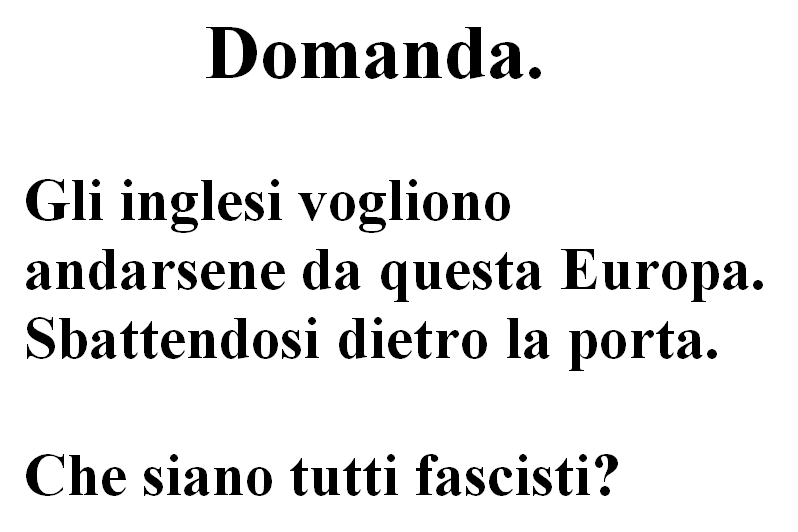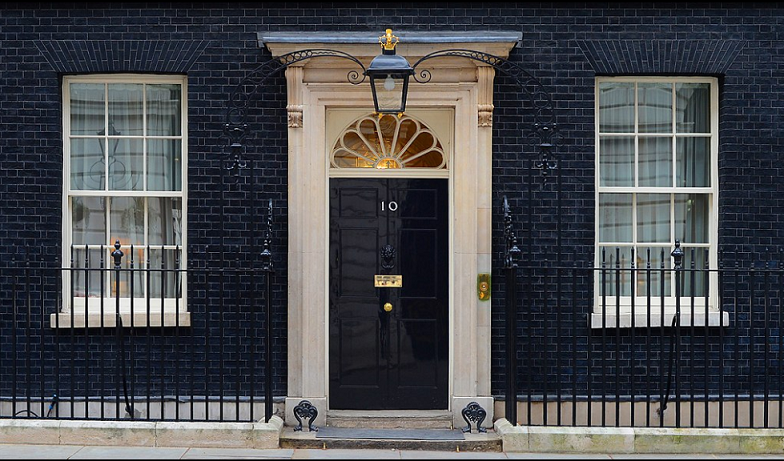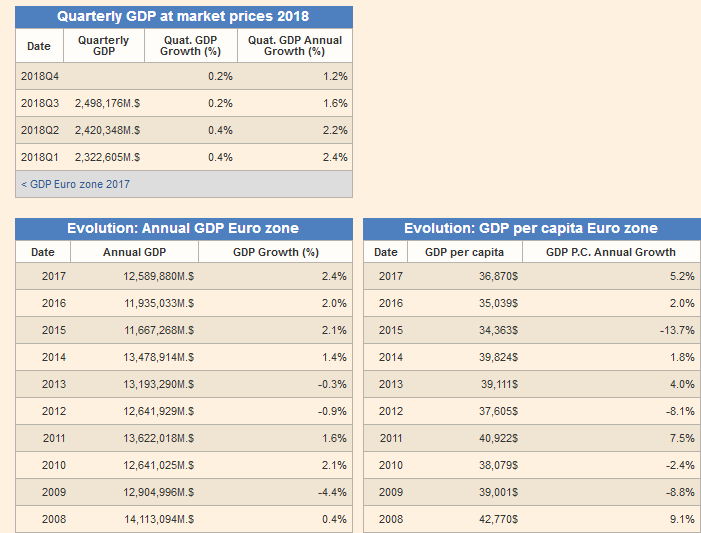Tag: Mr Tusk
Mrs May. Dimissioni dopo il quarto voto, indipendentemente dal risultato.
Giuseppe Sandro Mela.
2019-05-18.
«British prime minister Theresa May has agreed to step down at some point after her fourth attempt to pass an EU exit deal in June, no matter what the outcome»
*
«Her decision was revealed on Thursday (16 May) by a senior Conservative MP, Graham Brady, the chairman of the so-called 1922 Committee, an influential backbench group within the party»
*
«We have agreed to meet to decide the timetable for the election of a new leader of the Conservative Party as soon as the second reading has occurred and that will take place regardless of what the vote is on the second reading – whether it passes or whether it fails»
*
«The deal has already been defeated three times on grounds that provisions related to the Irish border could see Britain stuck in a customs union with the EU for an indefinite amount of time»
*
«The first defeat, in January, by 230 votes, was the largest ever for a government motion in British history»
*
«May, who herself wanted to keep Britain in the EU during in the 2016 referendum, has been vilified by hardline Brexiteers for her handling of the process»
*
«further procrastination which is causing appalling damage to the Conservative party»
*
«For his part, Boris Johnson, a former foreign minister and hard Brexiteer, said he would “of course” throw his hat into the ring to take May’s job when she left.»
* * * * * * * *
Diamo atto a Mrs May di come sia stato, e sia tuttora. impossibile trattare con persone quali Mr. Juncker, Mr Tusk, Mr Oettinger, Mr Macron e Frau Merkel, la rigidità mentale delle quali supera l’immaginabile e l’inimmaginabile. Si sono comportate come galline isteriche, avendo recepito il Brexit per quello che è: un severo e pesante giudizio sul loro comportamento ed operato.
Ma nel contempo non possiamo negare quanta sprovvida imperizia abbia dispiegato Mrs May nello svolgere il ruolo di primo ministro di Sua Maestà Britannica. Un esempio per tutti, la convocazione delle elezioni anticipate, dalle quali Mrs May è uscita con le ossa rotte.
Sia l’Unione Europea sia il Regno Unito avrebbero un disperato bisogno di personaggi politici meno ideologizzati e ben più pragmatici.
EU Observer. 2019-05-17. May to step down after fourth EU vote
British prime minister Theresa May has agreed to step down at some point after her fourth attempt to pass an EU exit deal in June, no matter what the outcome.
Her decision was revealed on Thursday (16 May) by a senior Conservative MP, Graham Brady, the chairman of the so-called 1922 Committee, an influential backbench group within the party.
“We have agreed to meet to decide the timetable for the election of a new leader of the Conservative Party as soon as the second reading has occurred and that will take place regardless of what the vote is on the second reading – whether it passes or whether it fails,” Brady said, following what he called a “very frank” 90-minute long discussion with the British leader.
British MPs are to hold two days of debate on the exit deal on 3 June, shortly after the European Parliament elections, with a vote likely on 5 June.
The deal has already been defeated three times on grounds that provisions related to the Irish border could see Britain stuck in a customs union with the EU for an indefinite amount of time.
The first defeat, in January, by 230 votes, was the largest ever for a government motion in British history.
The third defeat, in March, saw the bill fail by just 58 votes.
It prompted May to hold talks with the opposition Labour party, but these are expected to break up in the coming days without a new compromise due to Labour’s red lines, which include staying in the customs union in any case.
May, who herself wanted to keep Britain in the EU during in the 2016 referendum, has been vilified by hardline Brexiteers for her handling of the process.
Brady said on Thursday that she was “determined to secure our departure from the European Union”.
But Andrew Bridgen, a pro-Brexit Tory MP, continued to attack her, saying that her plan for a fourth Brexit vote was “further procrastination which is causing appalling damage to the Conservative party”.
May was “an increasingly beleaguered and isolated prime minister, who is desperate to salvage something from her premiership and is prepared to drive through an agreement that would fatally hamstring any future prime minister in negotiations with the EU,” he added.
For his part, Boris Johnson, a former foreign minister and hard Brexiteer, said he would “of course” throw his hat into the ring to take May’s job when she left.
The UK was due to leave the EU in March, but the political stalemate in Westminster have seen that delayed to 31 October.
They have also seen support for the Tories plunge to new lows – just 11 percent of people plan to vote Conservative in the European Parliament (EP) elections, according to recent polls, putting it in fourth place behind the Brexit Party, Labour, and the Liberal Democrats – in what would mark its worst result in any vote since the Conservative party was formed in 1834.
The prospects of a potentially protracted Tory leadership battle and new general elections, on top of Westminster’s summer recess, bode ill for the UK agreeing a new exit deal by the October deadline.
The prospects of a new, anti-EU Tory leader taking over the talks, in the context of a powerful show of support for the anti-EU Brexit Party in the EP vote also bode ill.
Some in Europe have said it should offer to extend the deadline still further in the hope that Brexit might fall by the wayside.
“We should go soft on Britain, give them time, they are still in the EU, let’s give them space,” Polish foreign minister Jacek Czaputowicz told the Reuters news agency this week.
“It’s a matter of changing the rhetoric to let the Brits rethink their decision,” he said.
Others, such as German chancellor Angela Merkel, are playing their cards close to their chest.
When asked in a recent interview what might happen if a new British leader tried to renegotiate the UK’s exit terms in the autumn, she said merely: “Should there be anything to negotiate, the European commission will do so on behalf of the 27 member states, as it has done so far”.
But with few in the UK or in Europe keen for Britain to live with no deal in place, in what would likely wreak economic havoc on both sides of the English Channel, she added that British indecisiveness could see the process strung out even further.
“In order for the UK to leave the EU, there needs to be a parliamentary majority in London for, rather than merely against, something,” Merkel said.
Unione Europea risultato di una dirigenza inetta. I numeri della débâcle.
Giuseppe Sandro Mela.
2019-03-08.
Il Wall Street Journal è lapidario nella constatazione dei fatti.
«the European Commission cut the 2019 eurozone growth forecast from an already anemic 1.9% to 1.3%. Economic output in the eurozone was lower in 2017 than it was in 2009; over that same period, gross domestic product grew 139% in China, 96% in India, and 34% in the U.S.».
La colpa di un simile disastro è da imputarsi in toto all’attuale dirigenza.
Mr Hollande, Mr Macron, Frau Merkel, Mr Renzi, Mr Gentiloni, Herr Rutte come capi di stato, Mr Juncker, Mr Tusk, Mr Oettinger, Mr Moscovici come eurocrati.
Sono dei falliti che hanno trascinato l’Europa al fallimento.
Ma il Wall Street Journal è stato ancora con la mano leggera.
Se invece del 2009 avesse optato per il 2008, i dati sarebbero stati ben peggiori.
Nel 2008 il pil dell’eurozona era 14,113.094 miliardi Usd, ed a fine 2017 era 12,589.880 miliardi.
Similmente, il pil procapite è crollato da 42,770 Usd a 36,670 Usd.
Riassumendo: il pil è sceso di 1,523.21 miliardi Usd ed il pil procapite di 6,100 Usd.
Tutto il mondo ha progredito tranne che l’eurozona, che invece è regredita.
Ripetiamo solo per chiarezza: la colpa di un simile disastro è da imputarsi in toto all’attuale dirigenza. Scomparire sarà l’unica cosa decente che abbiano fatto.
* * * * * * *
«decline of Europe as a force in world affairs»
*
«The Continent’s Grand Unity Project Is Failing»
*
«As its economy lags behind, Europe is becoming more divided politically»
*
«A recent report from the European Council on Foreign Relations projects that anti-EU parties from the right and left are on course to control enough seats in the near European Parliament that they will be able to disrupt the EU and weaken it further»
*
«two factors contributed to the continent’s geopolitical decline in the 20th century»
*
«One was inevitable the wealth gap between Europe and the rest of the world necessarily narrowed»
*
«The second factor in Europe’s decline was internal division and nationalistic animosity»
*
«The Euro was both an economic and political failure; and, diplomatic unity remains a distant dream»
*
«China takes Japan and India more seriously than it takes the EU»
*
«Leaders in France and Germany remain firmly committed to the European project, but with Britain on the brink of secession, Italy and Poland mutinous, and Hungary left defiant, the outlook is dimming»
*
«forced harmonization is engendering: distrust, resentment, ridicule, contempt and even hatred, amongst and between the people’s of the European continent»
*
«We have an elitist, bureaucratic, corrupt, authoritarian, repressive institution and leadership on one side and, a demoralized, lost generation of youth who see an “unaccountable, undemocratic, illegitimate and ultimately repressive super-state” that is digging Europe and themselves into an even deeper hole»
*
«A country and its citizens cannot subordinate its sovereignty to an unaccountable, sclerotic, bloated bureaucratic entity in Brussels»
*
«That is why Brexit passed; and, a vibrant, continent-wide nationalist movement took hold»
*
«The demise of the EU and the Euro as currently conceived; and it is only a matter of when, not if»
* * * * * * *
È veramente molto difficile non essere di accordo con il Wall Street Journal quando dice:
«A country and its citizens cannot subordinate its sovereignty to an unaccountable, sclerotic, bloated bureaucratic entity in Brussels»


